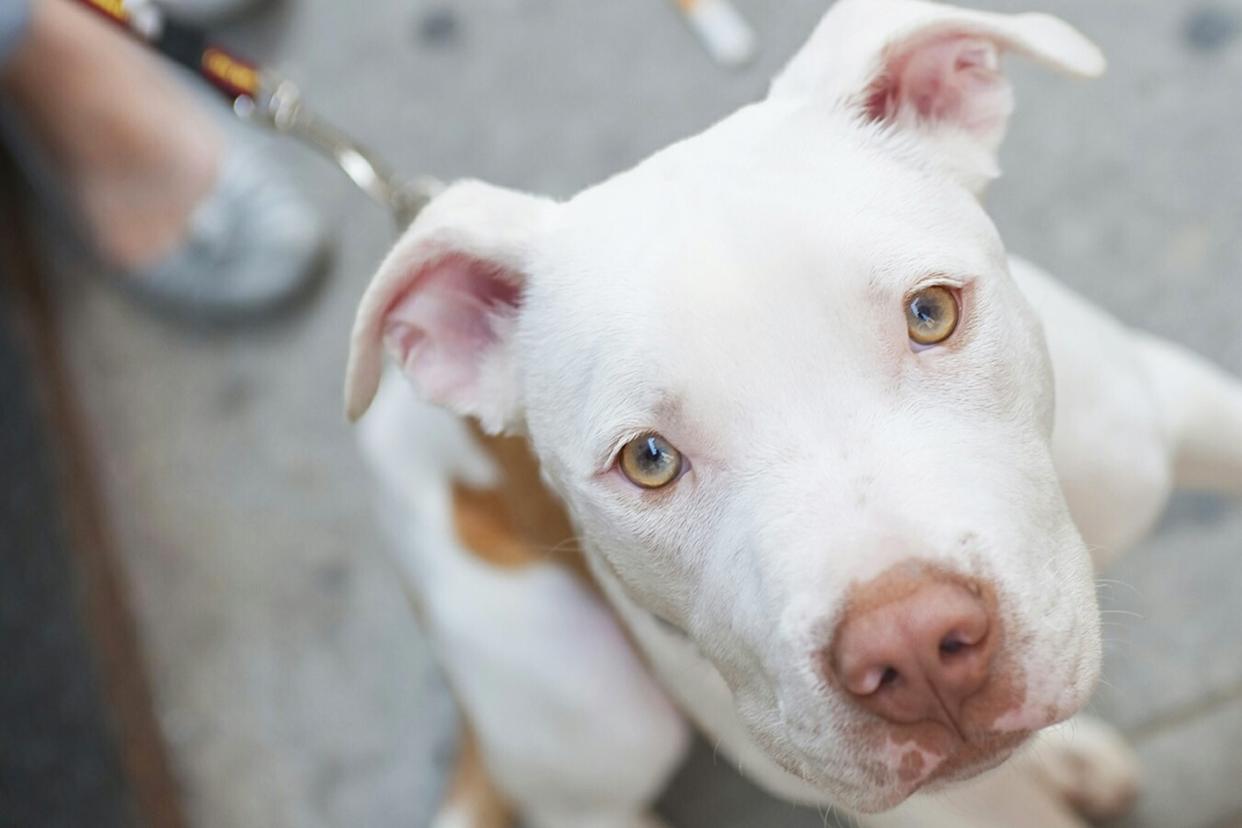Why Is My Dog Coughing Up White Foam?

Frederic Galka / EyeEm / Getty
TABLE OF CONTENTS
On This Page
Causes
Emergencies
Treatment
Prevention
Your dog makes an odd noise from the other room, and you hurry in to find a pile of white, foamy liquid. Most people call this either vomit or their dog coughing up white foam, but that's not always the case. First, we must figure out if this white foam is from coughing, vomiting, or regurgitating. Then, we can discuss the causes of each and determine what you should do to get your dog feeling better.
Why Dogs Throw Up White Foam
The causes of your dog throwing up or coughing white foam can come from a variety of different sources and can be most easily determined by figuring out if your dog is coughing, vomiting, or regurgitating. Here's how to tell the difference and the causes of each symptom.
Coughing
Coughing in dogs looks a lot like coughing in people. If your dog is coughing white foam, the foam usually comes up at the end of a coughing episode following a gag. Causes of coughing white foam include:
Kennel cough or respiratory viruses
Vomiting
Aside from coughing, your pet could also be vomiting white foam. Vomiting takes abdominal effort; prior to vomiting, your dog's abdomen will lurch as the abdominal muscles contract, causing your dog to heave. Vomiting white foam can occur if your dog is making and swallowing too much saliva, which is a sign of nausea. Causes of vomiting white foam include:
Dietary indiscretion, such as getting into the trash can
Obstruction of the stomach or intestines, which can occur if your pet eats an item like a toy or sock
Bloat or gastric dilatation and volvulus (GDV), which is when the stomach bloats and then twists
Gastroenteritis from infection, food allergies, or more
Regurgitating
Regurgitation can be hard to differentiate from vomiting. Regurgitation occurs passively; if your pet spits up white foam without any sort of forceful motion or noise preceding it, they are likely regurgitating.
Regurgitation of white foam is uncommon. In puppies, regurgitation may be due to congenital conditions or severe illnesses like parvovirus. In adult dogs, the presence of a dilated esophagus (megaesophagus), irritation to the esophagus, or a neurological condition that affects swallowing or the movement of food through the digestive tract can cause regurgitation.
Is Coughing Up White Foam an Emergency?
Once we've determined if your dog is coughing, throwing up, or regurgitating white foam, here's the next question: Is this an emergency?
Consider pursuing immediate veterinary attention if you note any of the following signs:
Shallow, rapid breathing
Breathing that takes a lot of effort
Pale or bluish gums
Repeatedly coughing, vomiting, or dry-heaving
Severe diarrhea
Bloated abdomen
Pain in the abdomen when you pick your dog up
Weakness, lethargy, disorientation
If you think this is an emergency, take your pet to the nearest 24/7 emergency veterinary service. We recommend calling to let the clinic know you're on your way.
In non-emergent cases, you'll still want to call your veterinarian to get an appointment scheduled. A dry cough followed by gagging up white foam is often kennel cough and may be accompanied by mild discharge from the eyes and nose. Collapsing trachea, which is common in small dogs, can cause a dry, honking cough when your dog is excited. This condition can become serious over time, so it is a good idea to watch your dog closely even if it's a chronic condition.
If your dog vomits once or twice but is otherwise normal, you can offer them a small amount of food and monitor throughout the day. If they vomit more than twice in a day, vomit for multiple days, or develop additional symptoms, call your veterinarian. Any regurgitation would warrant at least a check-up with a vet.
You can always call your veterinary clinic for help determining if your pet should be seen immediately. Going to an emergency clinic is significantly more expensive than waiting for an appointment, but if you are unsure if your pet can wait, peace of mind is priceless.
RELATED: 9 Signs That You Need to Get Your Pet To the Emergency Room
Treatment
Treatment depends on the underlying cause of our dog's coughing, vomiting, or regurgitating white foam. Typically, your veterinarian will recommend at least X-rays to figure out what's going on—these may be done on the chest/lungs as well as the belly.
If there is an infectious cause, your veterinarian may prescribe antibiotics, antifungals, or medications that kill parasites. Sometimes, cough suppressants are recommended by the vet to reduce dry coughs.
For vomiting, your veterinarian may recommend fluids (IV or under the skin), nausea medications, dietary changes, and antacids. In cases of obstruction or a bloated abdomen, surgery could be necessary. Some causes of regurgitation in puppies can be improved surgically.
In adult dogs, regurgitation is reduced through lifestyle management, such as feeding your dog upright or changing the consistency of your pet's diet. Work with your veterinarian to determine the best treatment for your pet's symptoms.
RELATED: How Cerenia for Dogs Can Help Your Queasy Pup
How to Prevent Your Dog From Coughing Up White Foam
Vaccination and monthly preventatives can help to prevent several infectious causes of coughing up white foam, such as the distemper virus or heartworms. During your vaccination appointments, your veterinarian will also listen to your dog's heart and lungs, which can help to detect common heart diseases early.
Reducing your pet's access to trash or swallowable items can also decrease your pet's risk of developing gastrointestinal distress that leads to vomiting white foam. If your pet has had an episode of coughing or vomiting, contact your veterinarian for advice on preventing future episodes. Most causes of regurgitating white foam cannot be prevented but are instead managed through changes to your pet's lifestyle upon a veterinarian's recommendation.

